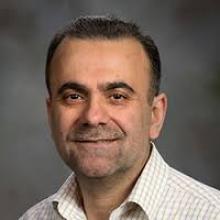J. Byron Maupin Professor of Biomedical Engineering and Mechanics, Associate Dean of the Graduate School, Director of the I/UCRC Center for Energy Harvesting Materials and Systems, Virginia Tech

Muhammad Hajj is a Professor of Engineering Science and Mechanics (ESM) and the Director of the I/UCRC Center for Energy Harvesting Materials and Systems (CEHMS). Dr. Muhammad R. Hajj joined the Graduate School in January 2014.
Dr. Hajj's areas of interest are: Fluid mechanics, structural dynamics and fluid structure interactions with nonlinear dynamics as the underlying basis.
Talk Title:
Identification of nonlinear piezoelectric coefficients
Talk Abstract:
"Attention to piezoelectric materials has increased dramatically in recent years. This interest rises from the potential for their use in many applications for various objectives. They have been suggested for developing self-powered micro systems and sensors, active-passive vibration control and damping systems, energy harvesters, and impedance based structural health monitoring devices. In more recent studies, piezoelectric/ceramic materials have been proposed in biomedical applications as load and wearable sensors for knee joints and as receivers to oxygenate tumors and charge pacemakers. Extending the realm of applications of piezoelectric materials comes with a price, as large strains can cause the material to behave in a nonlinear manner and exhibit amplitude-dependent resonant frequencies, sub- and super-harmonics in the response, saturation phenomena, and hysteresis behaviors. As such, identification of the nonlinear electromechanical constitutive relation must be performed to design, analyze, optimize and/or exploit such behaviors.
We discuss a parameter identification scheme that exploits the vibration response of an energy harvester to estimate parameters representing nonlinear piezoelectric coefficients. We develop the governing equations of a beam with tip mass and piezoelectric layer using generalized Hamilton's principle and by accounting for mechanical energy, virtual work and electric enthalpy. We then use the method of multiple scales to determine the approximate solution of the response to a direct resonant excitation. We show that the nonlinear behavior captured by the method of multiple scales in the form of an approximate solution and amplitude and phase modulation equations can be used to identify parameters of the nonlinear piezoelectric constitutive relations."
